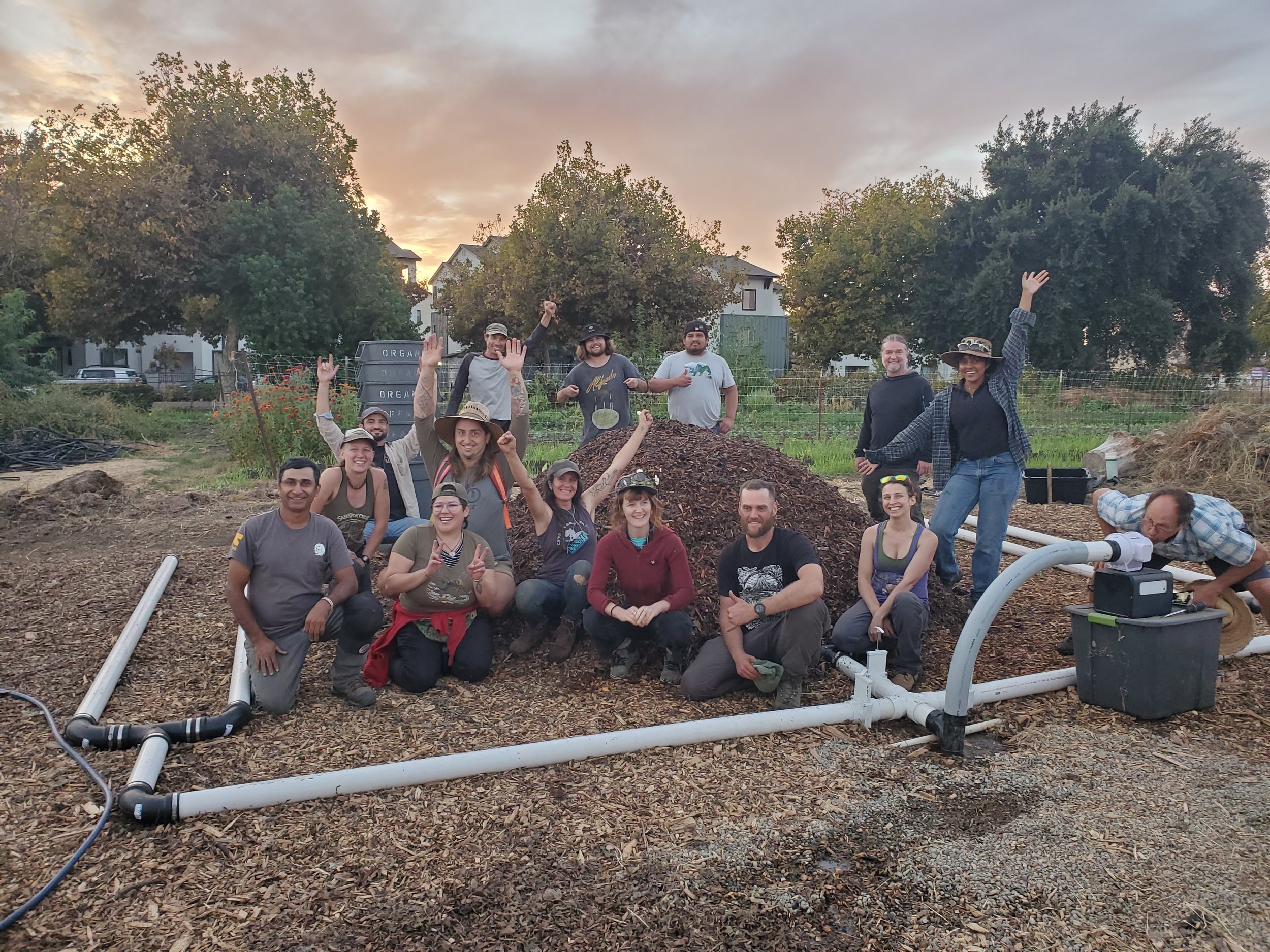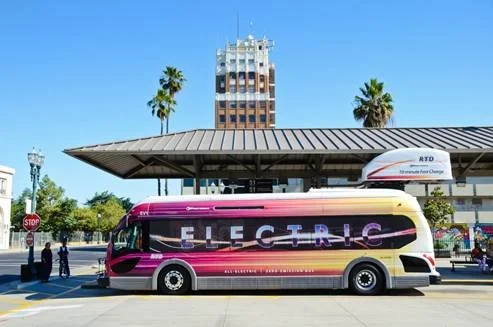California Department of Resources Recycling and Recovery’s (CalRecycle) Community Composting for Green Spaces Grant Program is funding community composting at hundreds of sites across California. In the first cycle of funding, the grant program awarded $1.5 million to the People, Food, and Land Foundation, which supported community composting at 117 sites throughout California, planted 488 trees, created 4,418 cubic yards of compost, and reduced emissions by 2,508 MTCO2e of GHG emissions. An additional $4.2 million was awarded to the California Alliance for Community Composting and LA Compost in the second cycle of the program. Through the establishment or expansion of community composting sites, communities receive benefits such as part time jobs and training on composting practices, fresh produce from adjacent gardens, training on farming practices, an increase in shade from tree planting, and the development of green spaces.
Zero-Emission Truck and Bus Project Delivers Cleaner Air in San Joaquin Valley
Paving the Way for Zero-Emission Freight Facilities in Long Beach
This program will deploy 38 electric yard trucks, 9 electric gantry cranes, 18 electric heavy lift forklifts, and 15 zero-emission Class 8 trucks. The program is also including a workforce development component with curriculum being developed to support the deployment of this technology with local school districts near the three port locations, community colleges and Long Beach State University.
Wishing Tree Park Provides New Green Space in West Carson
One of the Los Angeles Neighborhood Land Trust’s most exciting parks currently under construction is the 8.5‑acre, multi‑benefit Wishing Tree Park located in unincorporated West Carson, Los Angeles County. This project has been in the works for decades, and thanks in part to a $2,500,000 grant from California Climate Investments through the Urban Greening Program the park will be opening to the public in late 2021.
Greening the Yellow Brick Road Project Transforms Street into a Symbol of Activity and Hope
With $4.1 million from California Natural Resources Agency’s Urban Greening program, this project is helping bring the community’s vision to fruition and will benefit thousands of community residents. The project will create a safe and green public space where neighbors can come together and a designated route for residents to bike and walk in a safe environment.
El Centro Free Trees Program Provides Education, Shade, and Cleaner Air
Free and Reduced Price Fares Increase Low-income Transit Ridership to Yosemite
High-Speed Rail Construction Prioritizes Jobs and Sustainability
The High‑Speed Rail Authority is responsible for planning, designing, building and operating the first high‑speed rail in the nation. When complete, it will run from San Francisco to the Los Angeles basin in under three hours, providing a clean alternative to driving or flying. Funded in part by California Climate Investments, the project is already contributing to economic development and a cleaner environment, creating jobs, and preserving agricultural and protected lands.
Dairy Digester Program Expands Student Research Opportunities and Supports Jobs
The digester projects provide substantial environmental benefits by improving local air quality. Replacing the open-air lagoons of waste with a covered lagoon digester reduces manure-related emissions. Also, utilizing the methane in near-zero emissions natural gas vehicles replaces diesel vehicles and reduces NOX emissions by an estimated 90%.
Clean Vehicle Rebate Project Jumpstarts Zero-Emission Vehicle Adoption
Car shoppers in San Diego can now get pre-approved before they purchase or lease an EV and then transfer the rebate amount directly to the dealership rather than applying for the rebate after the transaction. In just a few simple steps, the car dealership can claim the transferred rebate and use it to lower the customer’s down payment.
BlueLA Car Share Pilot Expands Clean Mobility Options for Low-income Angelenos
Electrifying Antelope Valley Transit
Antelope Valley Transit Authority is on their way to electrifying their entire fleet, thanks to funding from California State Transportation Agency. They have purchased 29 zero-emission battery-electric buses, including the world’s first 60-foot zero-emission battery-electric articulated bus, and the nation’s first battery-electric commuter coaches.
Community Members Lead Transformative Climate Solutions in Southwest Fresno
Connecting a Coachella Valley Elementary School with Safe and Resilient Water Supplies
Westside Elementary School in the Coachella Valley relied solely on well water for its drinking water. The well had an unfortunate history of both contamination and the inability to provide adequate water supplies to prevent fires. Thanks in part to a nearly $370,000 from California Climate Investments through the Safe and Affordable Drinking Water Fund, these problems have been solved.
Ukiah Students Breathe Easier Thanks to New Zero-Emission Buses
Powering Organic Agriculture with Solar+Storage
Oya Organic Farms, an organic vegetable farm in Hollister, received a $76,446 grant from California Climate Investments through the Renewable Energy for Agriculture Program that, together with a 76 percent match from the farm, will finance the installation of solar panels to power an irrigation pump and storage/office building. Their new 27‑kilowatt solar system allows the farm to use zero‑emission electricity for their domestic well and re‑invest energy savings towards the farm. Furthermore, a standalone 6.4‑kilowatt solar system coupled with battery storage will power the off‑grid produce storage room and office on the farm.
Building San Ysidro Community Capacity to Understand and Act on Air Quality Solutions
San Ysidro is a predominantly low-income, 93% Latino community, situated along the US-Mexico border, across from the Mexican city of Tijuana. Sources of air pollution include vehicle exhaust from traffic waiting to cross the San Ysidro Port of Entry, the largest land-border crossing in the Western Hemisphere, as well as air pollution from Mexico.
Improving Efficiency and Reducing Emissions through Alternative Manure Management
Dennis DaSilva is a second-generation California dairy farmer whose parents began the family’s first dairy farm in 1983 with 150 cows. The $375,000 grant has allowed Mr. DaSilva to replace an existing solid separation system with a new, more efficient manure separator and concrete pad. Separated manure is dried and composted on the concrete pad and is then used for bedding and fertilizer for forage crops.
Adaptive Reuse Brings Affordable Housing, Walkability, and Community Arts Space to Santa Ana
In June 2020, artists, their families, and low‑income earners in Santa Ana began moving into new affordable homes funded in part by a $12 million award from California Climate Investments through the Affordable Housing and Sustainable Communities program. In partnership with the Southern California Association of Governments, the Santa Ana Arts Collective development promotes sustainability and health through active transportation safety activities, supported by over .5 miles of bicycle facility improvements and 36 improved pedestrian crossings. The project also features a gallery space for resident and community artists, and Meta Housing is partnering with Western Community Housing to deliver on‑site adult education services.






















